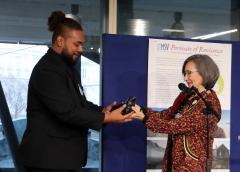The Pacific Islands is joining forces with Inuit Circumpolar Council (ICC) Canada in an initiative that brings together vulnerable communities and states to call for climate action at the International Maritime Organisation (IMO).
In the margins of the IMO’s 79th Marine Environment Protection Committee (MEPC) meeting on Tuesday in London, the two groups represented by John Kautave of Tonga and Lisa Koperqualuk, President of the Inuit Circumpolar Council, launched the initiative called Many Strong Voices.
“Today, we’re launching an initiative bringing together vulnerable communities and states to call for climate action at the IMO. The vision for Many Strong Voices is to promote the well-being, security, and sustainability of coastal communities in the Arctic and Small Island Developing States (SIDS) and LDCs by bringing these regions together to call for action on climate change mitigation and adaptation and to tell our stories to the world, said Koperqualuk.
Kautave said: “Our collaboration particularly reflects the fact that no matter where you are from, climate change affects us all, some of us more than others. The crisis that we indigenous communities face is existential, both physically and spiritually.”
He added: “Sea-level rise, extreme weather events, melting ice caps and thawing permafrost, threatens our continued existence in our home environments, and the destruction of our homes gravely impacts our cultural distinctiveness, threatens the preservation of our rich indigenous knowledge, and irreparably damages our sense of belonging. This is a reality that we do not wish to befall any community or country. And this is why the Kingdom of Tonga continues to push for equity in our responses to the threats of climate change.”
Kautave revealed his island kingdom was already witnessing a rise in sea-level of 15cm since 1993. He added that high sea-level has meant higher rates of coastal erosion, and increased salinisation of agricultural land (which is few and far between).
“Tonga’s capital of Nuku’alofa is highly susceptible to sea-level rise. This is particularly worrying because most of our critical infrastructure (ports, harbours, fuel storage) and our government buildings are located along coastal Nuku’alofa.
“If the current rate of sea-level continues (or increases), the entire township of Nuku’alofa could be underwater by 2100. The severity and intensity of extreme weather events is also felt, with Tonga experiencing two devastating Category 5 Cyclones in the space of two years. Which is too soon for our recovery capacity. These extreme weather events affect our capacity to adapt and be resilient in the face of climate change,” he said.
Koperqualuk said Inuit share many of the same challenges with the Indigenous Peoples and other citizens of Small Island Developing States (SIDS) and Least Developing Countries (LDCs). She added these include a dependence on the global shipping fleet for re-supply, economic development, and transportation.
She said shipping is critical infrastructure and ensuring that it is sustainable is a shared concern.
“Also, it’s top of mind for us that economic impacts from the decarbonisation of the sector will not leave us, who did not cause the cause the crisis, further behind. Global forums such as the IMO must support a just and equitable transition for the most vulnerable, including Indigenous communities such as in my Inuit homeland,” she said.
She said the revision of the IMO’s Greenhouse Gas (GHG) reduction strategy must be in line with 1.5 degrees, and must compel states and shipping operators to act quickly.
Koperqualuk said a strong and significant absolute 2030 target, such as halving emissions by 2030, is particularly important to agree to at this stage.
“With my Arctic homeland disappearing before my eyes, deep reductions are a must,” she said.
Meanwhile, the current 79th Marine Environment Protection Committee (MEPC) meeting is discussing a proposal spearheaded by the Pacific nations Marshall Islands, Solomon Islands and Vanuatu that require ships to pay a contribution or levy to an IMO fund for every tonne of fuel the ship takes on board. The amount is higher for those fuels that have a high GHG emission measured on the lifecycle, and lower for those with less. For completely zero climate impact fuels it is zero.
SOURCE: PACNEWS














